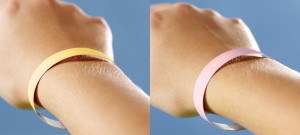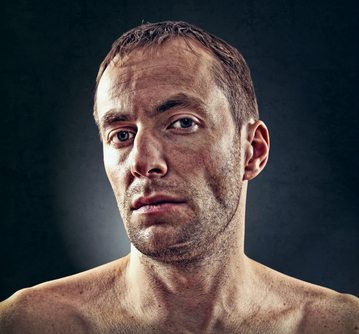Guyside: Your Skin
Bob is out today so I’m taking over Guyside this week. And what better than continue the topic that I started on Monday about skincare. Only this time, it’s the guys that I am most worried about. Did you know that not only has the bulk of research conducted on UV exposure and sun protection been conducted in women, but the few that have looked at men have discovered a rather troubling fact:
Guys are far less concerned about visible aging than women, in part due to different cultural pressures to retain a youthful look. But more importantly, when they skip the sunscreen, they do so because they actually like the effects of UV exposure on their skin. And, I am not referring to the glow of a tan but the ‘ruggedness’ of weathered skin.
When you go for rugged and weathered you may also be signing up for non-melanoma skin cancer (aka squamous cell), which men develop significantly more often than women. The reasons go beyond the lack of use of skin protection and cultural mores; laboratory studies in mice suggest that there are gender differences in how male and female skin reacts to UV light, and theoretically, men may produce less catalase, an enzyme that protects cells from damage.
It’s only squamous cell, right?! Well, hold on, because while it is not usually malignant, it can spread and cause serious complications when it gets into the lymph nodes. In some men, it’s a downright death sentence.
Getting back to the issue at hand: what does it take to get men to pay attention?
I’m not a man so I can only speak for the research. And in the scant research that has been conducted on this topic in men, the answer is pretty simple:
shock and awe.
In fact, when researchers gathered a small group of men between the ages of 18 and 34 and exposed them to a computer program that demonstrated their personal aging process based on UV and non-UV exposure, the guys who were immediately shocked by what they saw were the ones who indicated that the experience would affect their current use of sun protection agents and sun exposure behaviors. And among the ten guys who didn’t care? They tended to raise the positives about the way they appeared in the images.
“I think that I look quite tough…experienced…and weathered.” One man noted that he would have to be persuaded about the risk to his health.
It appears that on average, men engage in riskier sun exposure behaviors than women. Slapping on sunscreen is seen as feminine and some men are simply unfazed by facial aging, noting that wrinkles add character and rugged good looks.
But here’s the rub: after the rugged good looks phase come issues that are difficult to deal with. My dad, for example, grew up on a beach in the 30s and 40s. He’s spent his life having patches of skin removed and once handsome, he is simply an example of skin gone wrong.
Bottom line: sunscreen – wear it. And rugged good looks? All I can say is that some of you may remember the Marlboro Man. Four of these men died as a result of their behavior, in this case, smoking. But more importantly, statistics show that more than half of men don’t use sunscreen and about 71% don’t know squat about cancer warning signs.
Rugged good looks fade. Skin cancer doesn’t.
Read MoreSkin cancer, driving and technology
It’s Skin Cancer Awareness month, an important reminder to use sunscreen.
Indeed, according to recent estimates, skin cancer accounts for half of all cancers in the U.S. More than 3.5 million cases of basal or squamous cell skin cancer are diagnosed yearly; these types of skin cancer are generally found on the base or surface of the skin and can be cured if treated early enough. Melanoma — the most deadly of all skin cancers that affects the melanocytes, or cells that create skin pigmentation — accounts for more than 2/3rds of skin-cancer related deaths; this year, more than 76,000 cases are expected to be diagnosed. And, one person dies of melanoma in this country every 57 minutes.
In other words, skin cancer is not something to mess around with.
If you are like me, a child of the 60s and 70s, catching rays meant baby oil and tin foil. My father, who is in his late 80s, grew up on the beach and has spent the last 20 years having patch after patch of skin cancer removed. His body is a veritable skin cancer harvester, and he has even been permanently disfigured due to a botched procedure to freeze cancer cells below the surface of the skin on his nose. He’s lucky; he’s still alive and catching those cancers early enough.
I can’t emphasize it more: wear sunscreen. Moreover, wear it when you are in the car!
A study in last June’s issue of the Journal of the American Academy of Dermatology demonstrates that sun protection while driving is sorely lacking, despite the fact that driving evidently constitutes the largest percentage of total time spent outdoors, more than exercise or gardening. Moreover, on average, the majority of people in this country spend 80 to 100 minutes of their day in their cars.
Mind you, this is a retrospective study, which means that the researchers look back at events that have already occurred; this case, they mailed surveys to 675 patients who had previously attended a surgical clinic for skin cancer. Of all of these patients, 90% had a history of at least one type of skin cancer and 30, of malignant skin cancer.
Ironically? A majority did not believe that they needed to wear sunscreen while driving regardless of whether or not the windows were open or closed, although 53% of people with a prior history of skin cancer thought that they should wear it with the windows open. Real life use of sunscreen was different; about a third of these people reported wearing sunscreen “most of the time,” while only 15% used it while driving. What’s more, about a third of the people who reported wearing sunscreen most of the time while in a vehicle did not apply it to their arms or hands.
Additionally, having tinted car windows didn’t seem to provide additional protection. An equal percentage of people with or without tinted windows developed non-malignant skin cancer (85%); the only difference was the side of the body the skin cancer resided.
Here’s what you need to know:
- Automobile glass does not contribute to skin cancer equally. Important factors include the type of glass, the degree of tinting and the presence or absence of lamination or UV-absorbing film.
- In one study, clear auto glass transmitted 62% of UV radiation whereas dark-tinted glass transmitted 11.4%.
- Windshields are made from laminated glass that allows, on average, 2% transmission of UV radiation. Conversely, your side and rear windows are typically non-laminated and allow up to 80% of UV radiation. This means that the shoulder, arm and hand closest to the window needs to be protected because they are receiving the highest exposure to UV rays.
But, there’s a silver lining too!
Researchers at the University of Strahclyde in Glascow, UK have developed a monitor for preventing risk of overexposure to the sun. The device, which is called “Smartsun” is a waterproof wristband that changes color according to your amount of ultraviolet (UV) radiation exposure.
As exposure increases, the wristband turns from yellow to pink. 
The change in color is created by an acid-release agent that detects UV light and a dye to responds to pH levels.
Smartsun is currently available through UK retailers but global shipping is available through echemist. I don’t know about you but this seems like an easy way to keep track of sun exposure, even while driving.
Don’t mess with skin cancer. Wear sunscreen. And check out Smartsun!
Read MoreNewsFlash! Can fish oil supplements help prevent skin cancer?
Omega-3s. When it comes to a buzz, it keeps growing louder and louder. And while I’ve observed the buzz between a reduction in skin cancer risk and fish oils for some time now, the studies showing positive benefit have been done in rats, which makes it difficult to apply findings to humans. That is, until now.
Researchers from the University of Manchester in England published a paper in the American Journal of Clinical Nutrition online this past January that explored the first study of omega-3s and skin cancer in humans. And while the study is small, it’s a first step towards what could possibly be very good news for many .
For context, UV radiation (UVR) causes the majority of non-melanoma skin cancers and the incidence of these cancers continues to rise in particular, among white and lighter skinned individuals. Researchers believe that sunlight suppresses the ability of cells and the immune system to fight off skin cancer and infection, therefore allowing them to proliferate and cause cancer. This is one reason that people with diseases that suppress the immune system are more prone to developing cancer. However, there is some evidence that diets that are rich in omega-3 fatty acids are associated with reduced risk of skin cancer, perhaps as a result of how they benefit immunity.
The study included 73 women between the ages of 18 and 60 who sunburned easily with no or very little ability to tan. These volunteers either took 4 g of omega-3s daily (70% EPA, 10% DHA) or a placebo pill for 12 weeks and were exposed daily to 8, 15 or 30 minutes of simulated sunlight (via a special light machine). The results? Among women exposed to sunlight for 8 or 15 minutes a day, taking omega three supplements appeared to shut down immune suppression by as much as 50%. However the greater the sun exposure, the less effect omega-3s had, as the researchers did not observed the same protection among women who had 30 minutes of sun exposure daily .
The researchers say that the findings are important because most people apply sunscreen inadequately and don’t wear it daily. So, boosting daily omega-3 intake may potentially help protect against skin cancer, so long as sun exposure is limited. Still, bear in mind that omega-3s are not replacements for sunscreen; rather, consider them part of your armor against cancer. Meanwhile, we need bigger studies to see if these initial findings can be borne out in larger numbers of people.
Stay tuned. Whatever you do, omega-3s are good for your heart and perhaps, for you skin as well!
Read More








